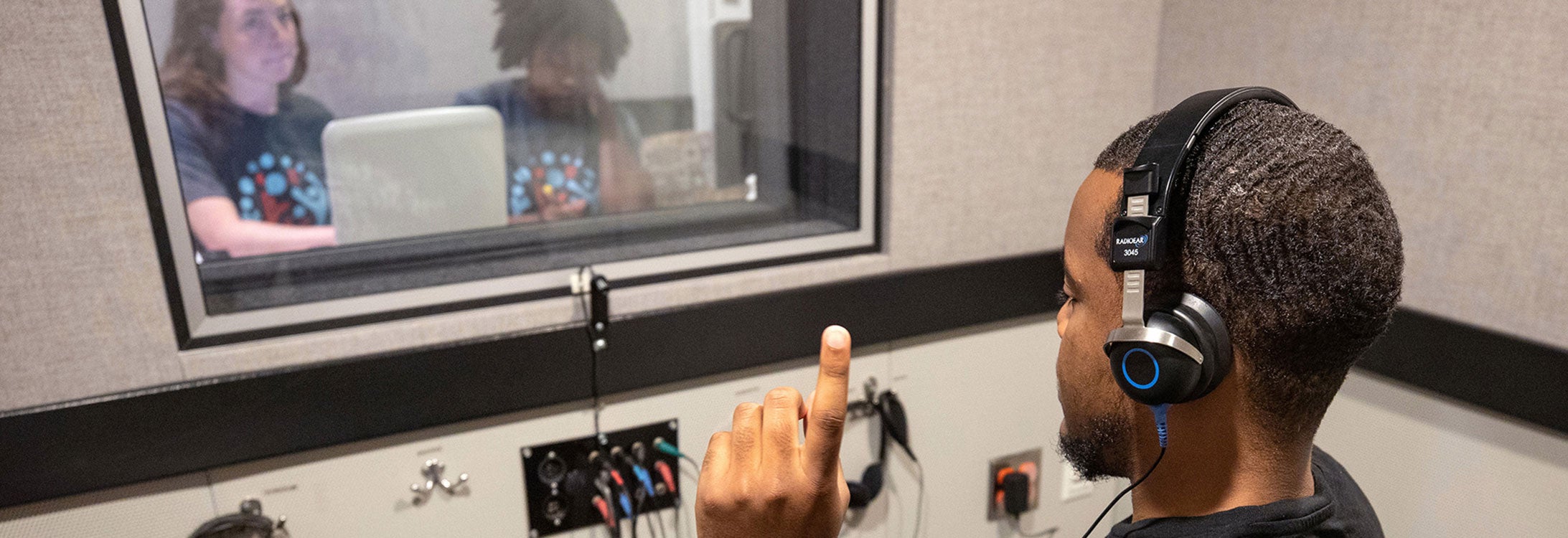Clinical Doctorate (AuD)
AuD
Can you picture yourself working with people with hearing loss and/or balance problems? Are you interested in using technology and evidence-based care to do so?
The profession of audiology has been ranked as one of the top five jobs with respect to physical demands, work environment, income, stress, and hiring outlook (CareerCast.com; 2013). East Carolina’s AuD program allows you to work closely with faculty and other audiology students to develop hearing health care skills. As an AuD student, you will learn to analyze and apply information related to the auditory and vestibular anatomy, diagnostics and rehabilitation, and non-medical treatments of the hearing and balance systems. The program also allows opportunities for clinical rotations throughout the community and nation, and mentored teaching and research with faculty members. Our departmental Speech-Language and Hearing Clinic offers a unique first experience in developing clinical skills in a variety of practice areas.
The profession of audiology will allow you to combine your interest in client interactions and the use of technology for evaluation and management. The process of identifying hearing loss can be emotional, but so can the experience of helping that individual with their communication abilities. The final year of the AuD experience is the Clinical Residency; students are encouraged to seek clinical placements throughout the nation, depending upon clinical practice interests.
Advising Information
Dr. William Eblin
eblinw15@ecu.edu
Student Resources
Get involved in Department Student Organizations: NSSLHA and SAA
- Scholarships
- Student travel awards to support conference travel (PDF)
- Tracking Clinical Hours (CALIPSO)
FAQ for Student
Where can I find the Graduate School’s Application Form?
Our application can be found online through the ECU Graduate school. Select “Audiology, AuD”.
How many students are accepted into the program?
Currently, the AuD program accepts approximately 12 students per academic year.
What are the required prerequisites for admission?
6 credit hours each: life sciences, behavioral sciences
3 credit hours each: physical sciences, English, mathematics, statistics, anatomy and physiology, language development
Other courses in communication sciences and disorders are strongly encouraged, especially relating to hearing science and audiology.
What if I think a course I have taken meets one of your prerequisites, but I am not sure?
Email the course description or syllabus for any course that is not taken at ECU to the Audiology Program Director, Dr. William Eblin (eblinw15@ecu.edu)
How many letters of recommendation do I need?
You need will three reference letters. It is typical that references are written by former professors, undergraduate advisors, employers, lab advisors, etc. At least two of the letters of recommendation should be from faculty members of the college(s) or university(s) previously attended.
What should I say in my personal statement?
Your personal statement should summarize your reasons for pursuing a clinical doctorate in audiology. This is an opportunity to showcase your personality and your purpose for applying to the program, as well as the field of audiology.
Is there an interview associated with my application?
Qualified candidates may be contacted to schedule a brief telephone, video call, or face-to-face interview.
When do I find out about the Admission Committee’s decision?
Please check your Pirate Port regularly for updates regarding your application status.
Are there graduate assistantships available? How do I apply for an assistantship?
Research and teaching assistantships are available to admitted first and second year students. Assistantships are merit-based and competitive; there is no separate application process.
Do you offer any financial aid/assistance for the Distance Education student?
Please contact the ECU Student Financial Aid Office (252-737-6610) for information regarding financial aid.
